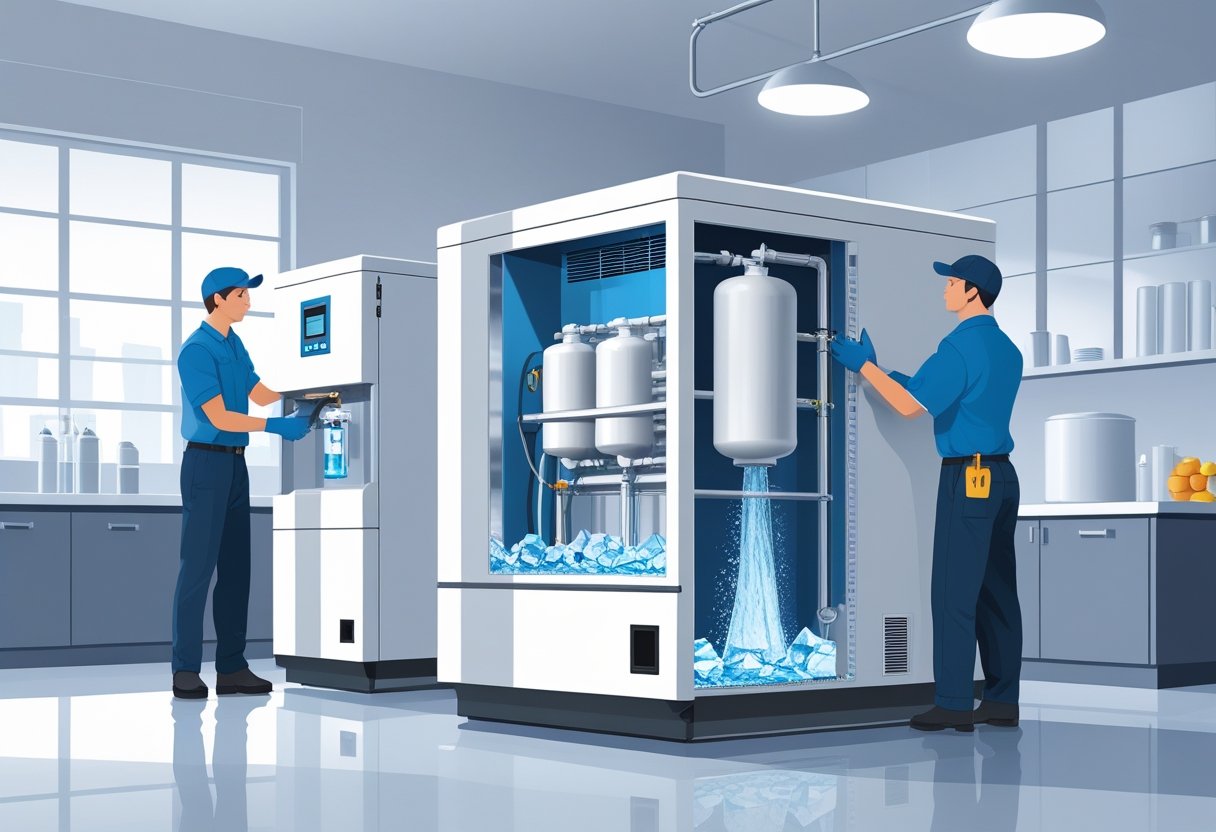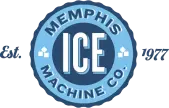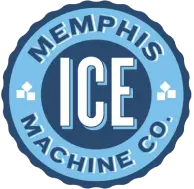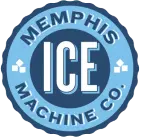proudly serving
the mid-south
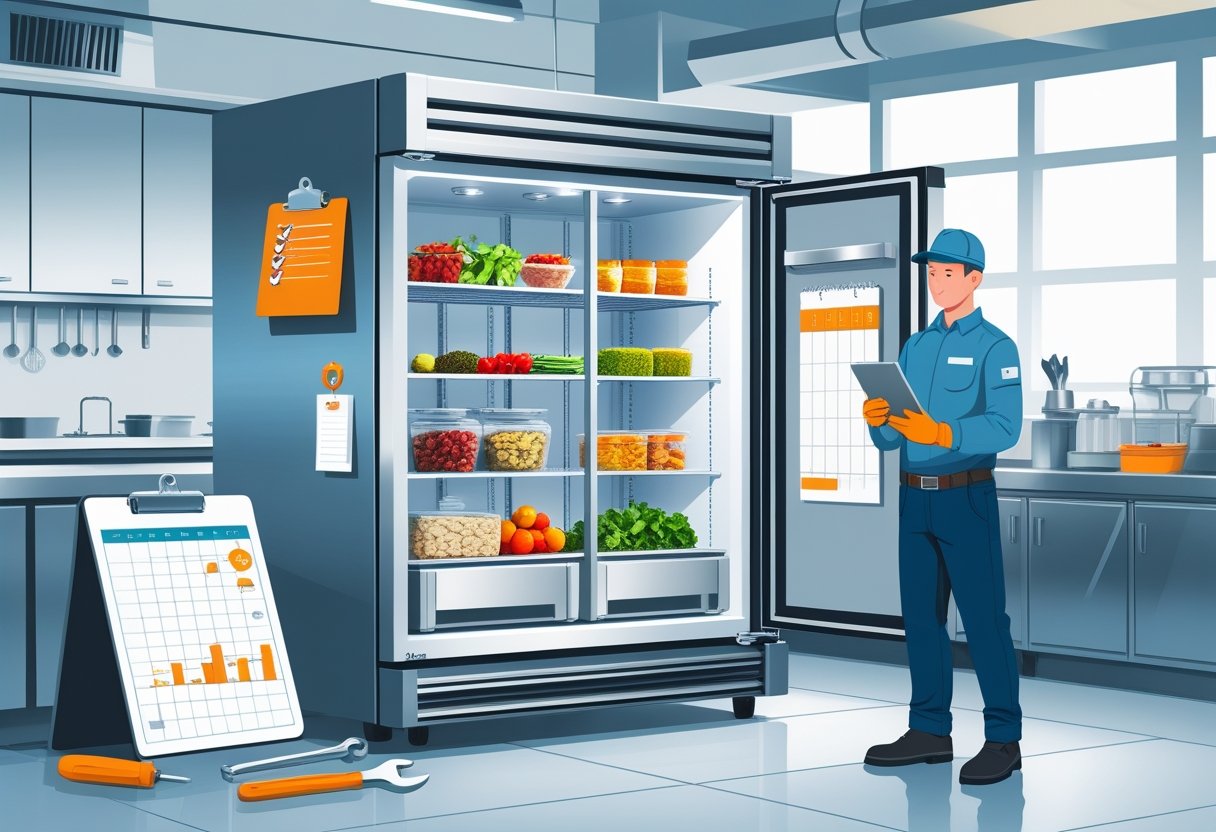
Commercial Refrigeration Maintenance Schedule Essential for Optimal Performance and Longevity
Keeping your commercial refrigeration equipment on a consistent maintenance schedule is essential to avoid unexpected breakdowns and costly repairs. A regular maintenance routine ensures your refrigeration system runs efficiently, protects your inventory, and extends the life of your equipment. Whether it’s a walk-in cooler or an ice machine, you need a plan that fits your operation and covers daily, weekly, and seasonal tasks.
At Memphis Ice, we understand how critical reliable refrigeration is to your business. From restaurants to healthcare facilities, your cooling systems must perform without interruption. Following a maintenance schedule designed by Memphis refrigeration experts helps you catch issues early and stay ahead of repairs, saving you time and money.
If you want to minimize downtime and maintain safe food storage, developing a clear and consistent commercial refrigeration maintenance schedule is key. This article will guide you through what to check and when, making it easier to keep your equipment—and business—running smoothly.
Understanding Commercial Refrigeration Maintenance Schedules
A commercial refrigeration maintenance schedule breaks down routine tasks needed to keep your equipment reliable and efficient. It guides you in prioritizing inspections, cleaning, and repairs, all tailored to your system’s components and type.
Following a clear schedule helps prevent costly breakdowns and extends the lifespan of your refrigeration units.
Purpose and Importance of Maintenance Schedules
A maintenance schedule ensures your commercial refrigeration systems operate at peak efficiency, reducing energy waste and preventing unexpected failures. Regular checks and cleaning can cut breakdown risks by up to 90%, saving you money and avoiding disruption.
Preventative maintenance protects your inventory from spoilage and meets health and safety standards required in food service and healthcare.
It also helps you spot issues early, minimizing repair costs and downtime. For example, Memphis Ice emphasizes consistent upkeep so your refrigeration worries stay minimal and your operations stay cool.
Types of Commercial Refrigeration Equipment
You might be managing several types of refrigeration units: walk-in coolers, reach-in refrigerators, prep tables, or ice machines. Each has unique maintenance needs.
Walk-in coolers require frequent door seal inspections and coil cleanings to maintain temperature consistency. Reach-ins need routine gasket checks and defrost cycles to avoid ice buildup.
Ice machines, like those Memphis Ice provides, have filters and water lines that must be serviced regularly to prevent contamination and mechanical failure. Understanding your equipment type helps you prioritize specific maintenance tasks.
Key Components in Refrigeration Units
Knowing the main parts of your refrigeration unit helps direct your maintenance efforts where they matter most. Key components include:
- Condenser coils: Remove heat; need regular cleaning to avoid overworking the compressor
- Evaporator coils: Absorb heat inside the unit; require cleaning to prevent frost buildup
- Compressor: The system’s “engine”; efficiency and long life depend on proper maintenance
- Door gaskets and seals: Keep cold air in and warm air out; damage here causes inefficiency
- Drain lines and drip pans: Clear blockages to prevent water damage and mold
By consistently checking and maintaining these parts, you safeguard your refrigeration system’s performance and reliability.
For an effective preventative maintenance checklist tailored to your equipment, visit commercial refrigeration maintenance guides to help streamline your upkeep tasks.
Establishing an Effective Maintenance Schedule
Creating a clear and consistent maintenance schedule for your commercial refrigeration is key to preventing costly breakdowns and extending equipment life. Breaking down tasks by frequency and having detailed checklists ensures that no important steps are missed and keeps your refrigeration running efficiently year-round.
Daily, Weekly, Monthly, Quarterly, and Annual Tasks
Your commercial refrigeration maintenance should be organized by how often different tasks need to be done. Daily tasks include checking temperature settings, cleaning spills inside units, and wiping exterior surfaces to prevent dirt buildup.
Weekly checks focus on cleaning condenser and evaporator coils, inspecting door seals for damage or gaps, and verifying that fans and vents are unobstructed.
Monthly tasks often involve deeper inspections such as checking refrigerant levels, lubricating moving parts, and tightening electrical connections.
For quarterly maintenance, it’s vital to schedule service with a professional technician for system diagnostics and critical component checks.
Annual maintenance should cover a detailed system overhaul, including refrigerant recharge, drain line cleaning, and ventilations assessments to ensure compliance and peak performance.
Maintenance Checklist Essentials
A thorough maintenance checklist keeps you on track with routine upkeep and helps spot issues early. Focus on these essentials:
- Inspect condenser coils for dust and debris — keeping them clean improves efficiency.
- Check door gaskets for wear to maintain airtight seals.
- Monitor temperature controls and calibration to meet safety standards.
- Clear drain lines to prevent water buildup and mold growth.
- Test alarms and sensors linked to temperature and power fluctuations.
Using a detailed checklist prevents overlooked tasks, which can lead to bigger repairs. Memphis Ice recommends integrating such checklists into your daily or weekly routines to maximize uptime and reduce breakdown risk.
Preventative Maintenance Planning
Preventative maintenance minimizes emergency repairs and food spoilage by addressing potential problems early. Establish a calendar system that assigns responsibility clearly—daily and weekly tasks can fall to kitchen staff while monthly and quarterly inspections are best handled by trained technicians.
Being proactive with tasks like coil cleaning and component lubrication improves energy efficiency and extends equipment lifespan. Professional inspections catch signs of wear or refrigerant leaks before they escalate.
Planning preventative maintenance around your business’s operational calendar ensures minimal disruption. For example, avoid scheduling major service during peak hours or summer surges when refrigeration demand is highest.
Documenting and Scheduling Maintenance
Keeping detailed records of all maintenance activities is essential. Use a simple log to track dates, tasks completed, findings, and any repairs made. This documentation supports warranty claims, regulatory compliance, and helps technicians diagnose repeated issues more quickly.
Digital tools like calendars or maintenance software make scheduling and reminders easier to manage. Assign clear responsibilities so your team knows who handles each task and when.
Memphis Ice encourages customers to keep these records accessible and review them regularly to spot patterns or recurring problems. Consistent documentation is a cornerstone of a lasting commercial refrigeration maintenance schedule.
For a practical starting point and examples, you can review a commercial refrigeration maintenance checklist with detailed tasks by frequency.
Critical Maintenance Tasks for Optimal Performance
Maintaining your commercial refrigeration system requires focused attention on key components that impact performance and energy efficiency. Staying ahead with routine care helps avoid costly repairs and keeps your equipment operating smoothly through every season.
Temperature Monitoring and Control
Accurate temperature control is vital for food safety and equipment efficiency. You should regularly check temperature readings using calibrated thermometers or built-in sensors.
Set your refrigeration units to the manufacturer’s recommended temperature ranges—typically between 33°F and 40°F for refrigerators, and 0°F to 5°F for freezers. Fluctuations can signal a problem with the thermostat or cooling system.
Keep an eye on alarm systems, if your units have them, to catch temperature deviations early. Inconsistent temperatures can lead to spoiled inventory and compliance issues.
Coil and Component Cleaning
Dirty condenser and evaporator coils reduce heat transfer, forcing your system to work harder and increasing energy consumption. You should clean condenser coils every 3 months and evaporator coils more frequently if they collect frost or debris.
Use a soft brush or vacuum to remove dust and dirt from coils. Pay special attention to fan blades and drain lines, ensuring they are clear to maintain airflow and proper drainage.
Neglecting this task accelerates wear on compressors and may cause breakdowns, which Memphis Ice avoids by recommending scheduled cleanings in our maintenance plans.
Inspection of Door Gaskets and Seals
Door gaskets are your refrigerator’s primary defense against cold air loss. Inspect these seals monthly for cracks, splits, or warping.
A damaged gasket allows air leaks, causing temperature fluctuations and wasted energy. You can test gasket effectiveness by closing a dollar bill in the door; if it slides out easily, replacement is necessary.
Keep gasket contact surfaces clean and free of debris to maintain proper sealing. Replacing worn gaskets promptly minimizes energy waste and preserves your refrigeration unit’s lifespan.
Checking Electrical Connections and Motors
Electrical connections power your refrigeration system’s components, so inspecting them for wear or corrosion is critical. Loose or damaged connections can cause system failures or safety hazards.
Regularly inspect motors, including those driving fans and compressors, for unusual noises or overheating. Lubricate bearings if required, and ensure fan blades move freely without obstruction.
Address electrical issues quickly to prevent downtime. Memphis Ice technicians advise scheduling professional inspections annually for peace of mind and reliable operation.
Ensuring Food Safety and Compliance
Keeping your commercial refrigeration system in line with food safety standards hinges on precise temperature control, managing ice and moisture buildup, and maintaining cleanliness. These factors directly impact the freshness of your products and your ability to meet health regulations.
Maintaining Proper Temperature Settings
You need to monitor and adjust your refrigeration units to stay within the temperature ranges recommended for different food types—typically 32°F to 40°F for most refrigerated items, and below 0°F for frozen goods.
Use accurate digital thermometers to check temperatures daily. Avoid temperature fluctuations by regularly inspecting door seals and minimizing door openings during busy hours.
Temperature logs are essential for compliance and food safety audits. Keeping these updated demonstrates your commitment to safe food storage and helps prevent spoilage or bacterial growth.
Preventing Ice Buildup and Water Leaks
Ice accumulation inside your units reduces airflow, increases energy consumption, and can cause uneven cooling, leading to food safety risks.
Schedule regular defrost cycles based on manufacturer guidelines or observed ice buildup. Inspect drain lines and pans for clogs or leaks that might cause water to pool or damage electrical components.
Addressing these issues promptly avoids costly repairs and sanitation problems. Memphis Ice recommends including ice buildup checks in your maintenance schedule to keep your system running efficiently.
Sanitation and Cleaning Practices
Routine cleaning of interior surfaces, shelves, door gaskets, and drip trays is vital to avoid contamination and unpleasant odors.
Use approved cleaning agents that won’t damage your equipment or leave residues. Clean spills immediately to prevent mold and bacteria growth.
Establish a cleaning schedule—daily spot cleaning and monthly deep cleans help maintain hygiene without disrupting your operations. Proper sanitation supports compliance with health codes and reinforces food safety.
For a detailed maintenance routine tailored to your needs, consider professional support in the Mid-South region.
Explore comprehensive refrigeration maintenance checklists for keeping your equipment reliable and safe.
Maximizing Equipment Lifespan and Energy Efficiency
Keeping your commercial refrigeration in top shape means reducing wear and tear while cutting energy costs. Focused upkeep, proper refrigerant management, and scheduled professional care play critical roles in maintaining peak performance and protecting your investment.
Extending the Life of Refrigeration Equipment
Proper maintenance is key to lengthening your system’s lifespan. Regular cleaning of condenser and evaporator coils prevents buildup that forces the compressor to work harder. Inspect gaskets and seals frequently to avoid leaks that can strain components.
Replacing worn parts early, like fans and thermostats, helps avoid unexpected failures. Maintaining consistent internal temperatures reduces stress on compressors and motors, directly extending their service life. Track runtime hours and service logs to catch early signs of deterioration.
A proactive approach like the one employed by Memphis Ice will ensure your equipment continues running efficiently year-round, saving you from costly replacements or downtime.
Reducing Energy Consumption
Energy use rises sharply if components are dirty or faulty. Cleaning coils, checking airflow, and ensuring proper insulation are fundamental steps to keep energy consumption low. Faulty door seals and frequent liquid defrost cycles waste substantial energy and should be corrected immediately.
Energy-efficient systems rely heavily on correct thermostat calibration and optimized run cycles tailored to your specific load. Use programmable controls where possible to minimize unnecessary compressor operation during off-peak times.
A maintenance plan focusing on these specific tasks can cut energy consumption significantly. This not only lowers operational costs but also reduces the environmental footprint of your business.
Managing Refrigerant Levels
Refrigerant is critical to cooling efficiency and equipment health. Low refrigerant levels typically indicate leaks, which cause your system to run longer and less effectively. Regularly check pressures with proper gauges to ensure optimal refrigerant charge.
Handling refrigerant requires expertise to avoid environmental harm and comply with regulations. Make sure any refrigerant top-ups or repairs are performed by certified professionals to maintain system integrity.
Maintaining the correct refrigerant level maximizes cooling performance and prevents undue strain on compressors, which protects both equipment lifespan and energy costs.
Professional Maintenance and Service Visits
Scheduled professional service is essential in detecting and resolving issues before they escalate. Qualified technicians perform thorough inspections of electrical connections, compressors, and refrigeration lines that you might overlook.
During visits, professionals can identify subtle inefficiencies or worn parts, providing expert repairs that prevent costly breakdowns. Regular checkups also include cleaning and calibration of control systems, vital for consistent performance.
Look for a service provider who understands the specifics of your operation and regional conditions, like Memphis Ice, to get responsive, knowledgeable care that keeps things running smoothly no matter the season.
Frequently Asked Questions
Proper upkeep keeps your refrigeration equipment reliable and efficient. Knowing how often to service, what tasks to include, and what to inspect helps you maintain your units without costly surprises.
How often should commercial refrigerators be serviced to ensure optimal performance?
Most commercial refrigerators should be serviced every 3 to 6 months. High-volume environments like restaurants or hospitals might benefit from quarterly check-ups to prevent system strain.
Routine servicing supports airflow, avoids breakdowns, and preserves food safety. Scheduling regular preventative maintenance saves money long-term.
What are the essential tasks included in a commercial refrigeration maintenance checklist?
Key tasks include cleaning condenser coils, checking refrigerant levels, inspecting door seals, testing thermostats, and verifying electrical components.
You should also clear debris for proper airflow and monitor system pressures. Daily, weekly, monthly, and annual checks help maintain peak performance.
What can I expect to find in a commercial refrigeration maintenance schedule template?
A useful template outlines daily cleaning, weekly inspections, monthly detailed checks on motors and fans, and annual system evaluations.
It specifies tasks like coil cleaning, leak detection, defrost system checks, and lubrication points. This structure helps keep your maintenance organized and consistent.
Where can I find a comprehensive guide for routine commercial refrigerator maintenance?
You can access detailed maintenance guides online that cover step-by-step tasks to prolong equipment life and ensure efficiency.
Resources like maintenance checklists and preventive care instructions simplify your workload and reduce downtime. Memphis Ice offers tailored advice if you need expert local support.
Can I obtain a free checklist for freezer maintenance to adhere to best practices?
Yes, free detailed checklists are available that cover cleaning schedules, temperature monitoring, gasket inspection, and condenser coil maintenance.
These checklists help you prevent issues early and maintain optimum freezer performance. Staying proactive keeps your operation running smoothly.
What components are crucial to inspect during routine refrigeration system maintenance?
Focus on condenser and evaporator coils, fans, compressors, refrigerant lines, door seals, and control systems.
Ensuring each component functions well helps avoid unexpected failures. Checking electrical wiring and thermostat accuracy is also critical for system reliability.
Recent News
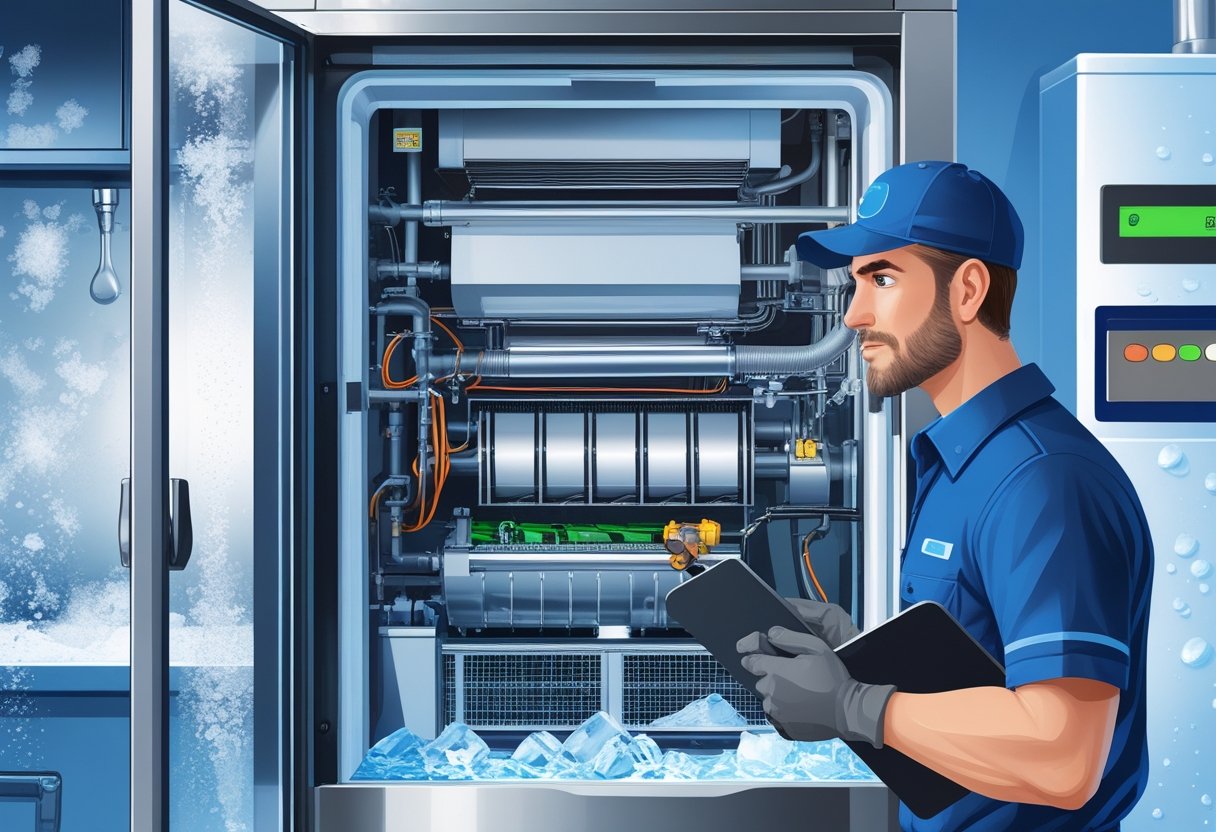
Why Is My Ice Machine Slow Causes and Quick Fixes to Improve Ice Production
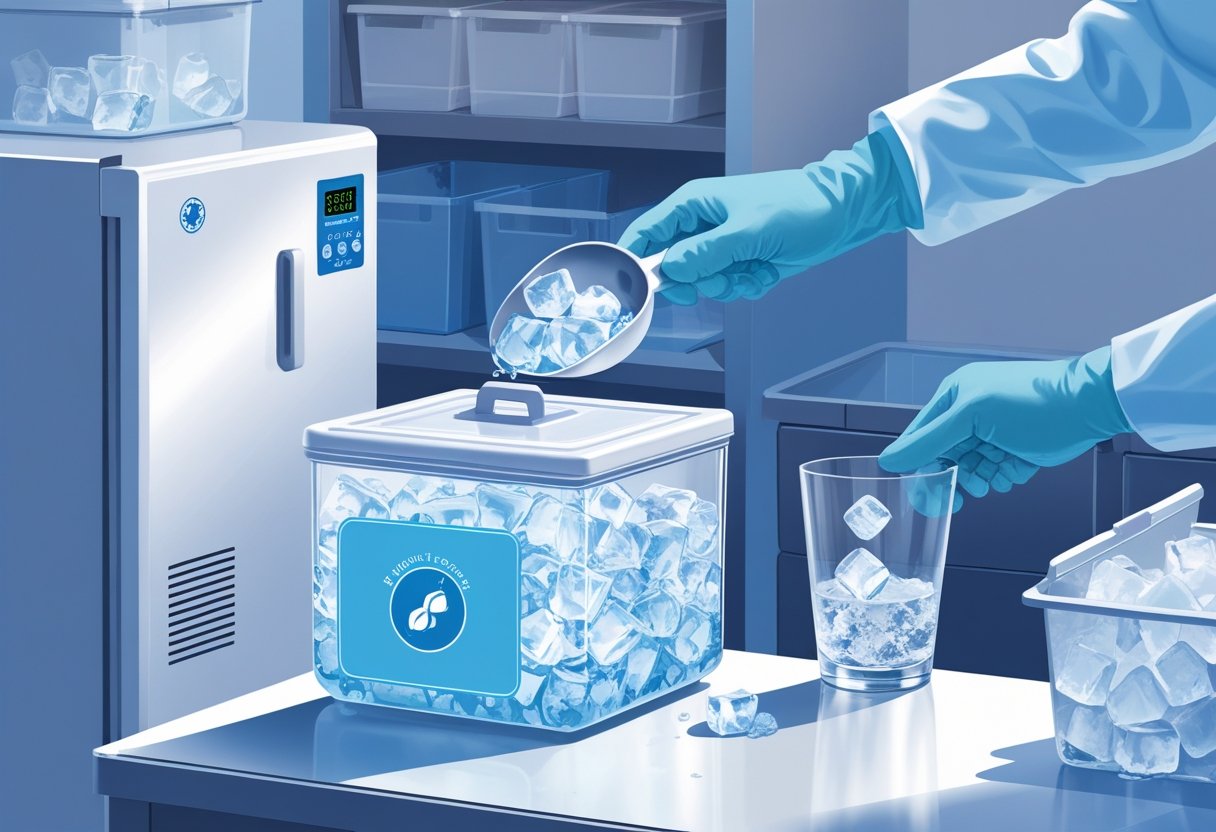
Best Practices for Storing Ice to Maintain Purity and Extend Shelf Life
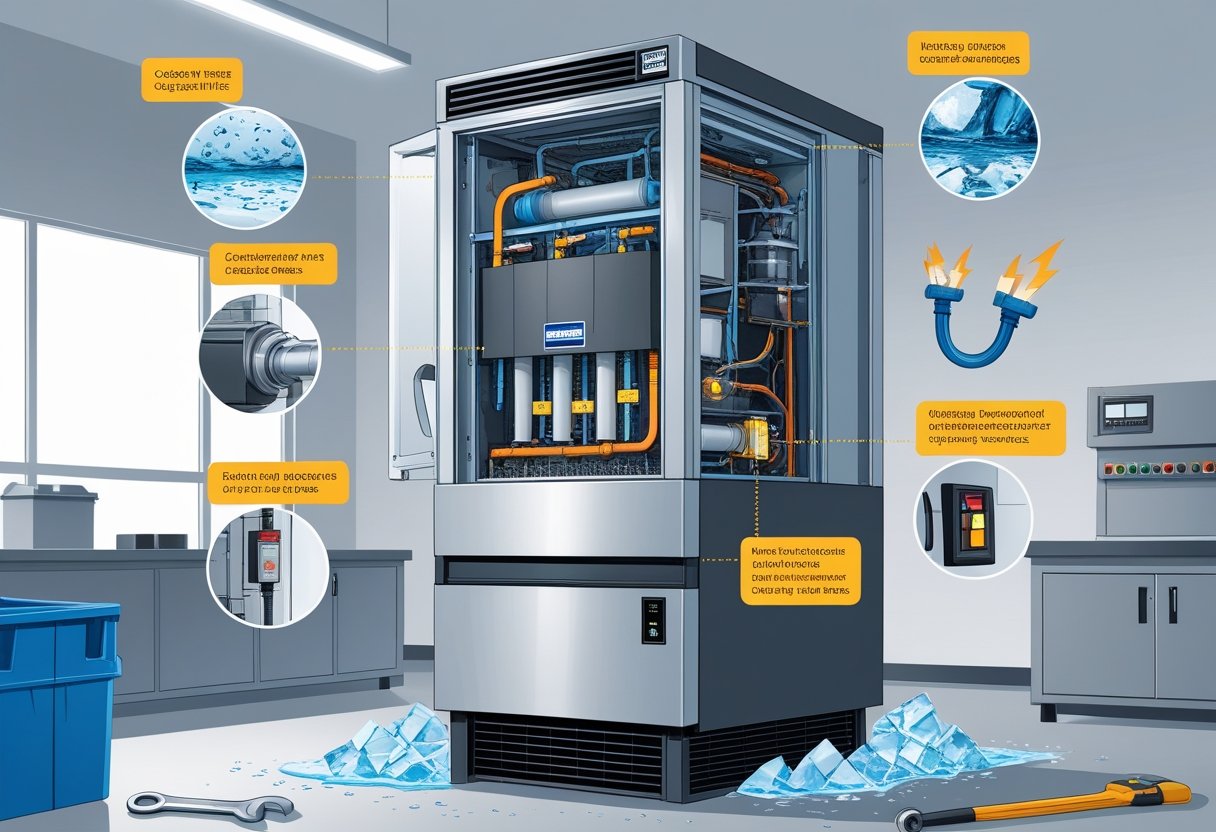
Top Reasons Ice Machines Fail and How to Prevent Costly Breakdowns
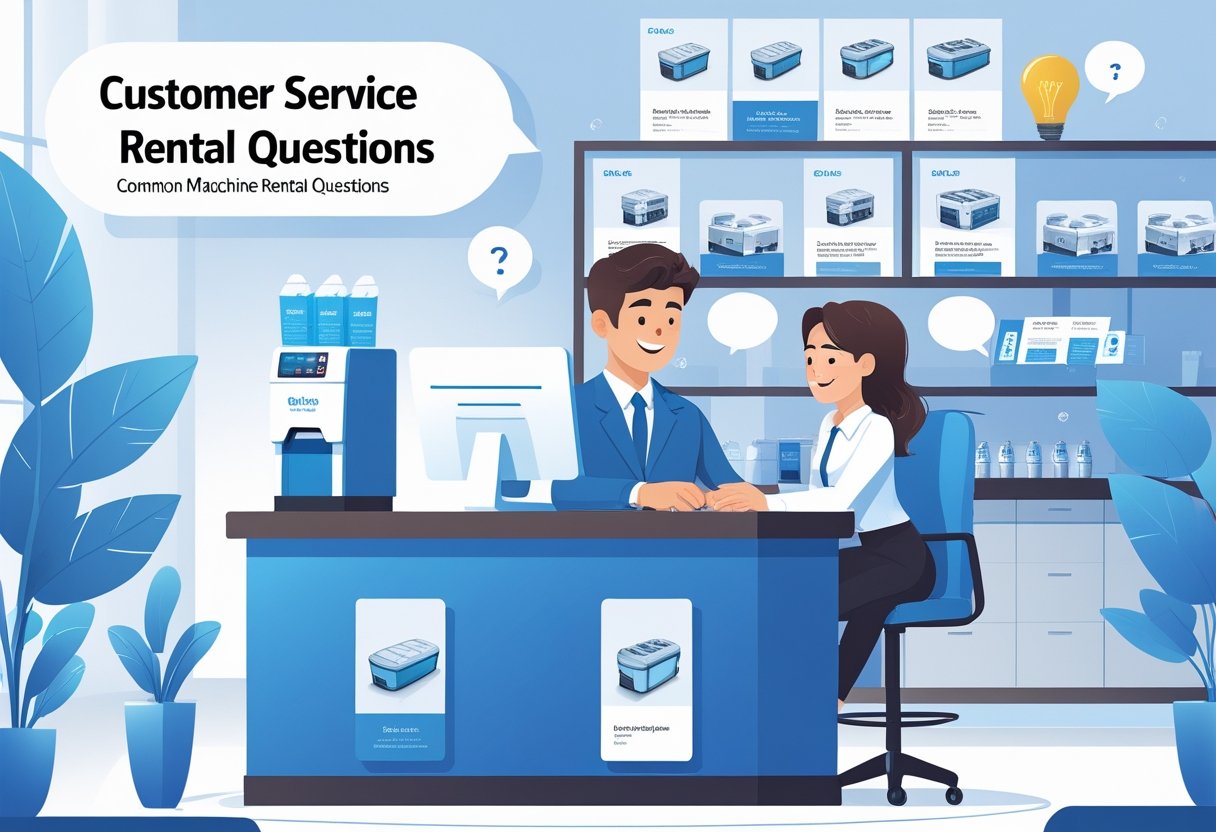
Common Ice Machine Rental Questions Answered for Event and Business Needs
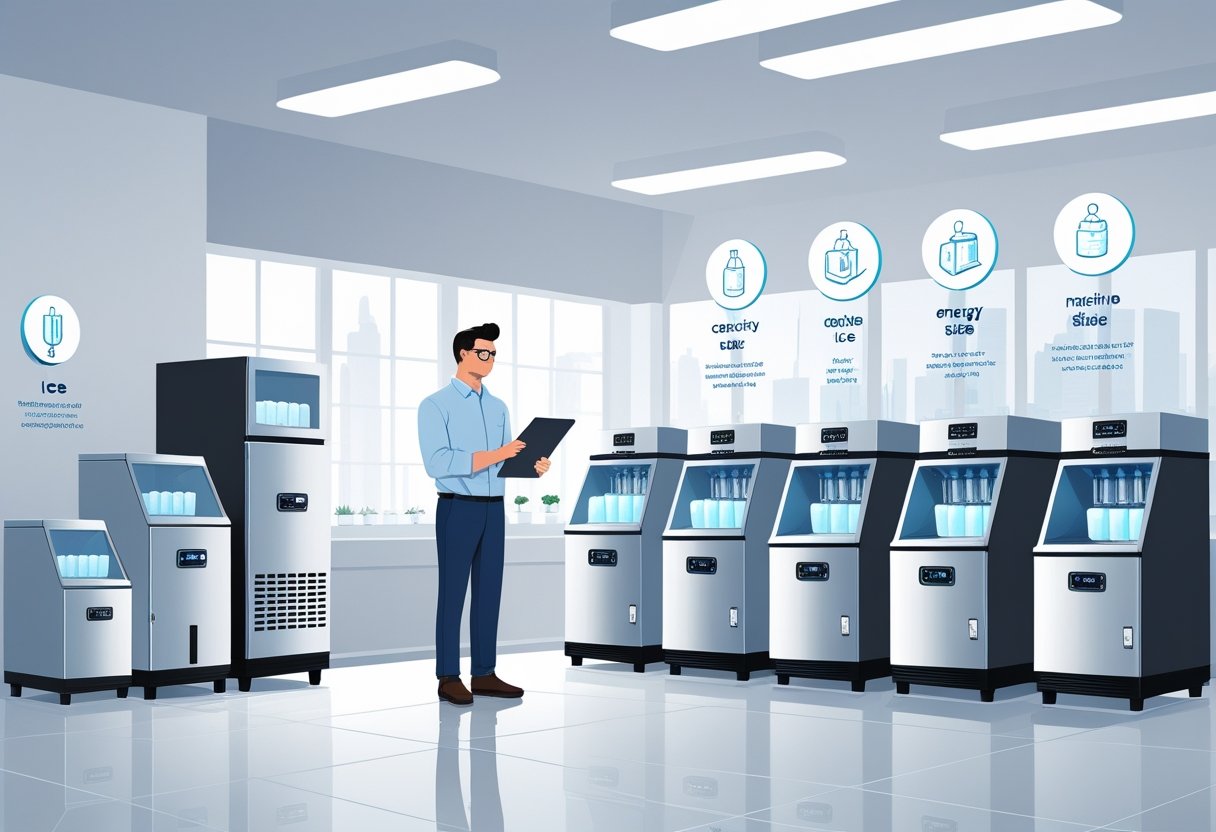
How to Choose a Commercial Ice Machine for Optimal Efficiency and Reliability
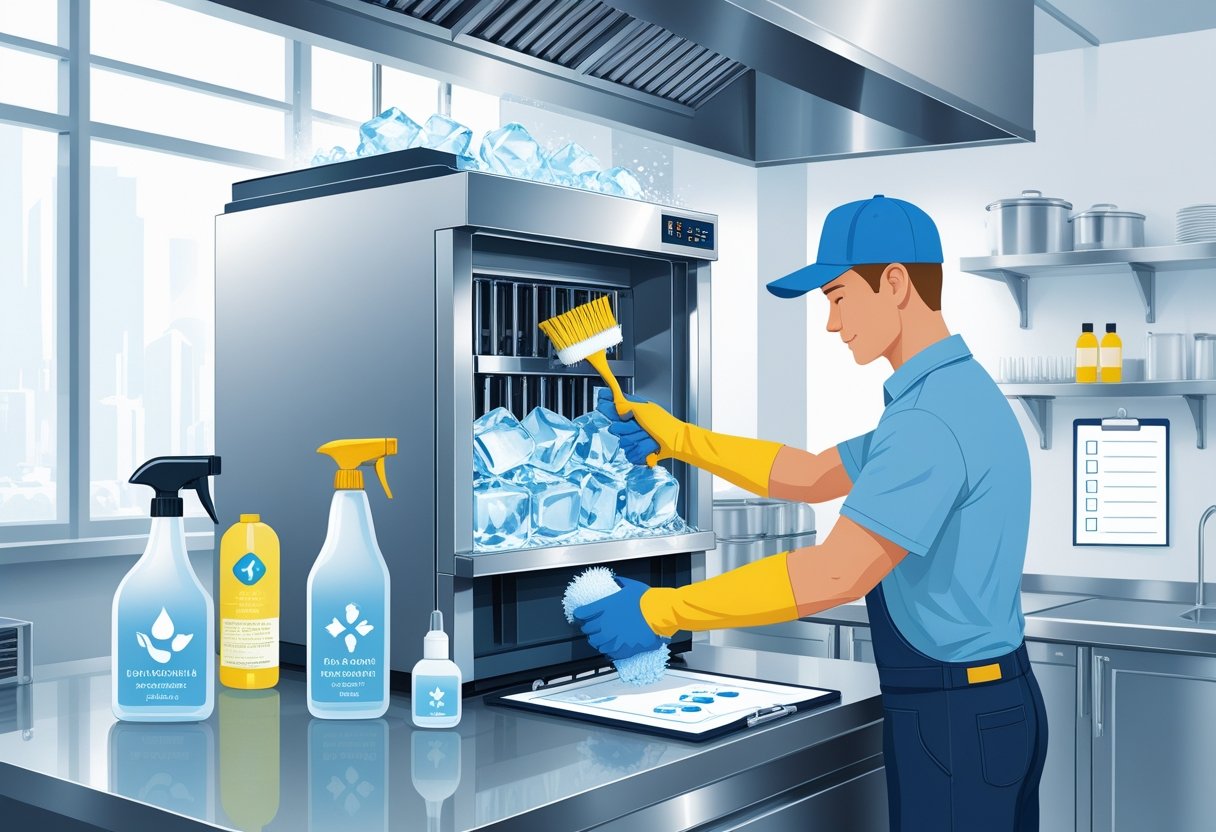
Importance of Routine Ice Machine Cleaning for Health and Efficiency Maintenance
